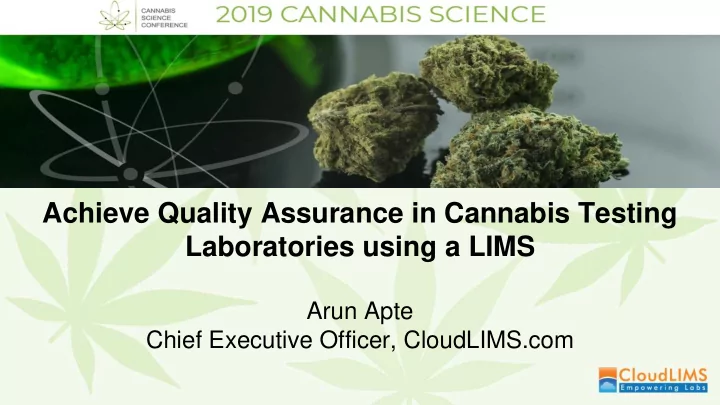

Achieve Quality Assurance in Cannabis Testing Laboratories using a LIMS Arun Apte Chief Executive Officer, CloudLIMS.com
Agenda What is quality assurance in Need for cannabis analysis cannabis testing? Importance of quality Benefits of using LIMS assurance How a LIMS helps in What challenges are faced while achieving quality assurance? achieving quality assurance?
Need for Cannabis Analysis vs.
What is Quality Assurance in Cannabis Testing? “The improvement of processes that ensure quality cannabis is provided to consumers” Conducting Regular quality tests auditing by adhering processes to validated methods Managing the operations of a Complying with cannabis testing local and state laboratory using regulations (like established GLP, ISO 17025, specifications, and 21 CFR Part standards, and 11 Compliance) testing procedures
Quality Assurance in Cannabis Testing Microorganisms Mycotoxins Heavy Metals Salmonella, E.coli for Aflatoxins contribute Residual Solvents Plants can absorb example cause serious to bone cancer Chemicals from the heavy metals like illness processing nickel, mercury, laboratories can be and lead from the harmful to sick soil/fertilizer which patients using the are toxic to humans extract Pesticides Foreign Material Keeps cannabis free Mold, organic from insects but can materials, dust or cause illness in anything that could humans adversely affect Moisture Content patients Potency Can be detrimental to the Cannabinoid and quality of cannabis. More than terpenoid concentration 12% is prone to mold growth
Importance of Quality Assurance • To ensure data integrity • To ensure consistent and accurate cannabis testing using validated test methods • To minimize the source of variation in testing consistency and accuracy cause due to unavailability of actual sample • To meet customer’s demands and expectations • Saves time and costs by detecting and fixing issues before they become larger
QA & QC Good Lab Practices The Main Facets of GLP Quality Measurability Traceability Integrity
QA & QC Regulatory Requirements
ISO/IEC 17025 Requirements Management Requirements Pertain to the operation and effectiveness of the quality management system within the laboratory Control of Records Document Control Internal Audits Organizational Review of Requests, Purchasing Services Structure Tenders, & Contracts & Supplies
Control of Records: Barcoding Sample accessioning with 1D, 2D barcoding or RFID to keep a track of sample through-out its life-cycle
Control of Records: Chain of Custody Track the entire chain of custody for all your samples
Document Control Maintain and track all documents, and maintain version control, helps to meet ISO 9001 certification requirements as well
Organizational Structure: Role Based Permission Level to Staff Users can be granted/revoked accesses to/from various functionalities based on their designation in the organization’s hierarchy
Review of Requests, Tenders, & Contracts All details related to a service requested by a client can be seen along with the ability to accept, reject and assign the task pertaining to a request
Purchasing Services & Supplies A ccurate barcode labeling of reagents and maintaining their stocks
ISO/IEC 17025 Requirements Technical Requirements Address the competence of staff, sampling and testing methodology, equipment, and the quality and reporting of test and calibration results Personnel Equipment Reporting of Results Test and Calibration Methods Measurement Ensuring the Quality of Test & Method Validation Traceability and Calibration Results
Personnel: Staff &Training Manage staff and training records and mark their competency
Equipment: Instrument Calibration and Maintenance Track your equipment and its components along with calibration status
Equipment: Assigning Competent Staff Assigning of instruments to competent analyst
Reporting Test Results to Clients Manage test results, generate CoA and send it to clients
Advantages of Instrument Integration Why should you interface? • Increases data quality • Increases accuracy • Increases throughput • Avoids duplication, saves $$$ • Enhances productivity • ROI typically less than a year
Instrument Integration A LIMS Supports: • Automatic time scanned uploads of mapped CSV files • Bidirectional data transfer using CloudLIMS web-based Rest API
Customized CoAs Per State Regulations
Test and Calibration Methods: Associating Docs Easily access the appropriate instructions for operation, handling of instruments and testing samples to ensure the personnel is using only latest/compliant methods
Measurement Traceability: Manage QC Samples Manage quality control samples and their results to detect trends
Validate Test Results Configure a test validation process, send multiple results for validation, select a verifier, track the validation status, thereby assuring the final test results
Associated Instruments: Testing the Quality of Results At the time of association of an instrument with a test, indicate that the instrument was properly calibrated before test was conducted
21 CFR Part 11 Compliance • Confidentiality of electronic records • Digital signature on electronic records • Audit trail compliance
User Access: Secure Confidential Data Provide full/limited/no access to different user groups to maintain confidentiality of information
Generate Reports with Authorized Signatures Digital signature with the name, designation and the date of signing
Dedicated Section for Audit Trail Manage complete audit trail of each activity along with a date & time stamp
A2LA or Other Accreditors for Cannabis Testing Accreditation A2LA offers accreditation to laboratories performing analytical testing of cannabis and cannabis-derived products, such as flowers, concentrates, butters/waxes, drinks, tinctures, oils and edibles, as well as hemp and hemp-derived products. Benefits of A2LA: • Labs can focus on improvements rather than rectifications • Provide a cost-effective way to get accredited • Provide professional, knowledgeable assessors, and make the entire process right from initial contact to assessments simple • Provides a dependable calibration program that makes labs well equipped for a scenario of micro-level scrutiny
Benefits of Automation Using LIMS • Eases data transfer and maintenance • Simplifies data traceability and eases data accessibility • Reduces manual intervention leading to improved quality and productivity • Reduces operational and implementation costs • Reduces human errors and time taken to follow protocols
Cloud-based LIMS Benefits No Upfront Cost No IT Personnel Configurable Quick to Deploy Light on Pocket Scalable Global Accessibility
Thank You! www.cloudlims.com +1-302-789-0447 support@cloudlims.com
Recommend
More recommend